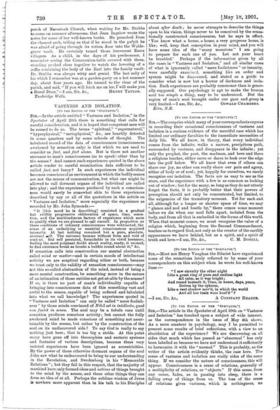VASTNESS AND ISOLATION.
[TO TUE EDITOR OF THE "SPECTATOR."]
Sru,—In the article entitled "Vastness and Isolation," in the Spectator of April 20th there is something that calls for careful consideration, and it is hoped that competent men will be roused to do so. The terms "spiritual," "supernatural," " hyperphysical," "metaphysical," &c., are heartily detested in some quarters and by some schools of thought. The tabulated record of the data of consciousness (consciousness awakened by sensation only) is that which we are used to consider as fact, and fact alone. But is there not another
entrance to man's consciousness (so to speak) other than by the senses ? And cannot such experiences quoted in the above
article render to careful examination data sufficient to be called fact, not fancy ? In such experiences the individual becomes conscious of an environment in which the bodily senses are not the means of communication, but what one might be
allowed to call dormant organs of the individual are called into play; and the experience produced by such a conscious- ness would surely be somewhat akin to those experiences described by any or all of the quotations in the article on "Vastness and Isolation," more especially the experience as recorded by Mr. John Symonds :—
"It [this mood he is describing] consisted in a gradual but swiftly progressive obliteration of space, time, sensa- tion, and the multitudinous factors of experience which seem to qualify what we are pleased to call ourself. In proportion as these conditions of ordinary consciousness were subtracted, the sense of an underlying or essential consciousness acquired intensity. At last nothing remained but a pure, absolute, abstract self. The universe became without form and void of content. But self persisted, formidable in its vivid keenness, feeling the most poignant doubt about reality, ready, it seemed, to find existence break as breaks a bubble round about it," ILc.
If sensation calls into construction our mental abstraction called mind or matter—and in certain moods of intellectual activity we are sceptical regarding either or both, because we trust only to the validity of sensation consciousness—may not this so-called abstraction of the mind, instead of being a mere mental construction, be something more in the nature of an intimation of those entities not get-at-able by the senses? If so, is there no part of man's individuality capable of bringing into consciousness data of this something vast and awful to the senses, capable of being ordered and tabulated into what we call knowledge ? The experiences quoted in "Vastness and Isolation" can only be called "mere foolish- ness" by those minds convinced of Nihil est in intellects, guod non fuerit in. sen.su. The soul may be a tabula rasa until sensation produces conscious activity; but cannot the fully awakened mind be made conscious of something not ascer- tainable by the senses, but rather by the construction of the soul on its undiscovered side ? To say God is really to say nothing just here; that is too big a stride. At this point many have gone off into theosophies and esoteric systems and fantasies of various descriptions, because these very isolated experiences have been ignored as eccentricities. By the power of these otherwise dormant organs of the soul John saw what he endeavoured to bring to our understanding in the Revelation, and Swedenborg in his "Memorable Relations " ; but they fail in this respect, that the majority of mankind have only formed ideas and notions of things brought
to the mind by the senses, and these other things they can form no idea of at all. Perhaps the sublime wisdom of Jesus is nowhere more apparent than in his talk to his Disciples
about after death ; he never attempts to describe the things open to his vision, things never to be conceived by the sensa- tionally constructed consciousness, but he says in effect, You know what a house, a home, a very gorgeous home, is like; well, keep that conception in your mind, and you will have some idea of the "many mansions" I am going to prepare for each one of you. Let not your heart be troubled.' Perhaps if the information given by all the cases in "Vastness and Isolation," and all similar cases of what is ignorantly called "mere foolishness" or insanity, were carefully examined, something like an order and system might be discovered, and stated as a guide to consider what is now but a horror of darkness and isola- tion. Such experiences are probably commoner than is gener- ally supposed. Our psychology is apt to make the human soul too simple a thing, easy to be understood. But the region of man's soul brought under our gaze and grasp is






































 Previous page
Previous page